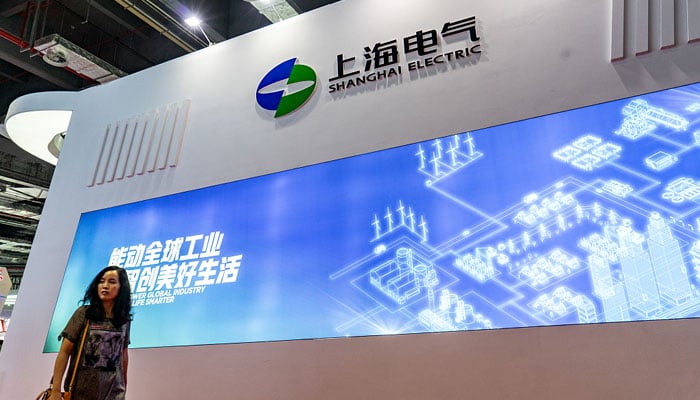Shanghai Electric closes financing for Thar coal plant
ISLAMABAD: China's Shanghai Electric Corporation has secured financial closure for Pakistan's largest coal-fired power plant, a key project under the China-Pakistan Economic Corridor (CPEC), the Private Power and Infrastructure Board (PPIB) said on Wednesday.
The 1,320 megawatt (MW) plant, located in the Thar desert in the Sindh, will use super critical technology to produce electricity at the lowest tariff of Rs4.98 per unit.
The financial closure was signed at a ceremony in Islamabad, attended by PPIB Managing Director Shah Jahan Mirza, Meng Donghai, Chief Executive of the Thar Coal Block-1 Power Generation Company, Zhou Bo, Chief Executive Officer of Industrial and Commercial Bank of China (ICBC), Karachi Branch, and senior officials of PPIB and the project company/sponsors, the PPIB said in a statement.
The project, which started construction amid the Covid-19 pandemic by using its own equity and bridging financing, was completed on Feb. 5, 2023, meeting the tight deadlines agreed by the governments of Pakistan and China.
Shanghai Electric Group Corporation is the project sponsor, while Sino Sindh Resources Limited (SSRL) is the coal supplier from Thar Block-1. ICBC, China Development Bank, Bank of Communications Co. Ltd., China Minsheng Bank Corporation, Postal Savings Bank of China Co., Ltd., and Agriculture Bank of China are the lenders of the project, while Sinosure is the insurer.
The plant is equipped with the latest equipment to comply with the environmental standards of the World Bank/IFC and Pakistan EPA.
The project is the second cheapest power project in terms of fuel cost, saving Pakistan around $500 million in foreign exchange annually, the statement said.
The project is expected to generate nine billion units of electricity per year, reducing the overall basket price of electricity by around Rs200 billion annually, it added.
-
 Gigi Hadid Feels 'humiliated' After Zayn Malik's 'pathetic' Comment: Source
Gigi Hadid Feels 'humiliated' After Zayn Malik's 'pathetic' Comment: Source -
 Olympics Men Hockey Game: McDavid, Crosby Power Canada Past Czechia
Olympics Men Hockey Game: McDavid, Crosby Power Canada Past Czechia -
 Sony PlayStation State Of Play Reveals 'Castlevania' And 'Metal Gear' Return
Sony PlayStation State Of Play Reveals 'Castlevania' And 'Metal Gear' Return -
 Ontario Tuition Freeze Ends, Allowing Colleges And Universities To Raise Fees
Ontario Tuition Freeze Ends, Allowing Colleges And Universities To Raise Fees -
 King Charles Should Apologise To All Rape Victims, Says New Poll
King Charles Should Apologise To All Rape Victims, Says New Poll -
 Cardi B Shares Emotional Message Amid Stefon Diggs Split Rumors
Cardi B Shares Emotional Message Amid Stefon Diggs Split Rumors -
 James Van Der Beek’s 'heartbroken' Ex Wife Breaks Silence Of His Death
James Van Der Beek’s 'heartbroken' Ex Wife Breaks Silence Of His Death -
 Sarah Ferguson, Shamed Andrew Spotted In ‘family Costume Drama’
Sarah Ferguson, Shamed Andrew Spotted In ‘family Costume Drama’ -
 Kylie Kelce Reveals Why She Barely Planned Her Wedding Day?
Kylie Kelce Reveals Why She Barely Planned Her Wedding Day? -
 Why Shamed Andrew Called His Victims ‘Mrs Windsor’
Why Shamed Andrew Called His Victims ‘Mrs Windsor’ -
 Kate Hudson Explains Why Acting Isn't Discussed At Home
Kate Hudson Explains Why Acting Isn't Discussed At Home -
 Prince William, Kate Middleton Epstein Statement Was AI Generated, Says Expert
Prince William, Kate Middleton Epstein Statement Was AI Generated, Says Expert -
 Sarah Ferguson On Her Way To Hurt 'only Two People Who Care About Her'
Sarah Ferguson On Her Way To Hurt 'only Two People Who Care About Her' -
 World’s Top PC Maker Sounds Alarm Over Memory Chip Shortage
World’s Top PC Maker Sounds Alarm Over Memory Chip Shortage -
 King Charles Is ‘clearly Worried’ Andrew Has Tarnished Royal Image
King Charles Is ‘clearly Worried’ Andrew Has Tarnished Royal Image -
 Royal Family Loses 'loyal' Worker After King Charles Disliked His Work?
Royal Family Loses 'loyal' Worker After King Charles Disliked His Work?




